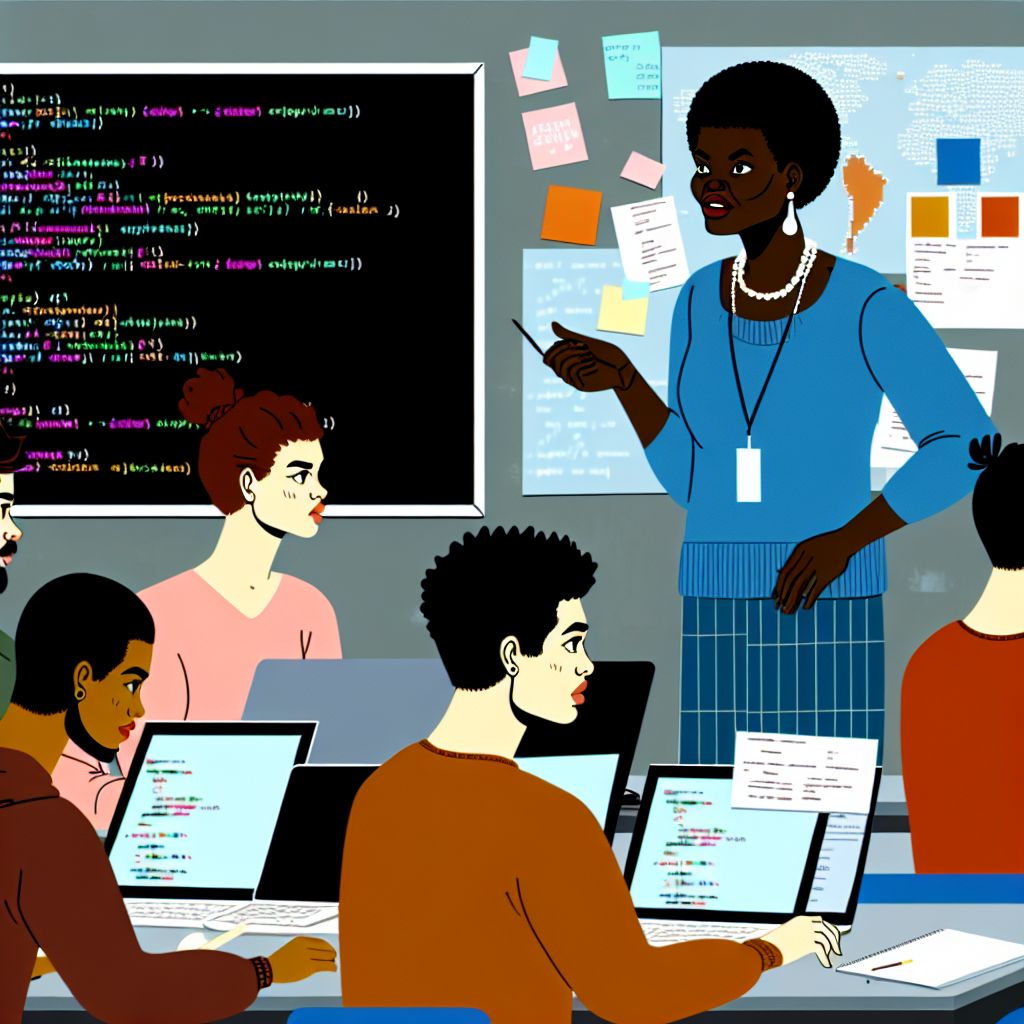Introduction to Mentorship in the Nigerian Tech Ecosystem
The Growing Demand for Skilled Programmers
Nigeria’s technology sector has expanded rapidly in recent years.
This growth creates a high demand for skilled programmers across industries.
Consequently, many beginners seek guidance to navigate their programming journey.
However, the lack of structured training programs can hinder newcomers’ progress.
The Importance of Mentorship
Mentorship bridges the gap between theoretical knowledge and practical application.
Experienced mentors offer personalized advice tailored to beginners’ needs.
They share insights on coding best practices and career development.
Ultimately, mentorship accelerates learning and builds confidence in novice programmers.
Mentorship Models in Nigeria
Several Nigerian tech hubs actively promote mentorship programs for beginners.
For instance, Lagos’s Andela Learning Community connects learners with local professionals.
Similarly, platforms like Decagon and STEM Cafe organize mentorship bootcamps.
These initiatives nurture talent by pairing mentees with seasoned software developers.
Challenges Faced by Beginner Programmers
Beginners often struggle with limited access to industry-relevant projects.
Additionally, inadequate networking opportunities can restrict professional growth.
Moreover, the rapid evolution of technology demands continuous learning.
Unlock Your Unique Tech Path
Get expert tech consulting tailored just for you. Receive personalized advice and solutions within 1-3 business days.
Get StartedMentors help newcomers overcome these challenges through guidance and support.
The Role of Mentors in Shaping Career Paths
Mentors assist beginners in setting realistic goals and crafting portfolios.
They also provide feedback on coding assignments and project structures.
Furthermore, mentors introduce mentees to important industry connections.
This support enables beginners to transition smoothly into professional roles.
Mentorship’s Contribution to the Nigerian Tech Community
Mentorship fosters a collaborative culture within the Nigerian tech ecosystem.
Successful mentorship relationships contribute to a stronger technology workforce.
They inspire a new generation of developers to innovate and excel.
Therefore, mentorship remains a vital tool for Nigeria’s technological advancement.
The Significance of Mentors for Beginner Programmers in Nigeria
The Foundation of Learning and Skill Development
Mentors build strong foundations for beginner programmers in Nigeria.
They share practical knowledge and real-world experience actively.
Through mentorship, learners gain clarity on complex programming concepts.
Moreover, mentors guide beginners to avoid common coding mistakes.
This guidance accelerates the acquisition of essential programming skills.
Unlock Premium Source Code for Your Projects!
Accelerate your development with our expert-crafted, reusable source code. Perfect for e-commerce, blogs, and portfolios. Study, modify, and build like a pro. Exclusive to Nigeria Coding Academy!
Get CodeProviding Encouragement and Motivation
Mentors inspire beginner programmers to stay focused and persistent.
They celebrate small wins, boosting learners’ confidence continuously.
Additionally, mentors help beginners navigate frustrations and setbacks effectively.
Therefore, beginners remain motivated even during challenging learning phases.
Offering Industry Insights and Networking Opportunities
Mentors connect beginners with the local tech ecosystem in Nigeria.
They introduce aspiring programmers to companies like Andela and Ingressive.
Furthermore, mentors share insight into emerging trends within the Nigerian tech landscape.
Consequently, beginners make informed decisions about their career paths.
Enhancing Career Growth and Job Placement
Mentors assist beginner programmers in building strong portfolios.
They provide interview preparation and resume guidance tailored to the industry.
Experienced mentors often refer mentees to job openings in Nigerian startups.
Thus, mentees access better employment opportunities faster than alone.
Creating a Supportive Learning Community
Mentorship fosters a sense of belonging among beginner programmers.
It encourages collaboration through coding bootcamps and local meetups.
Mentors establish safe spaces for asking questions without judgment.
Ultimately, this community approach strengthens programming skills and persistence.
How Mentors Help Bridge the Gap Between Theoretical Knowledge and Practical Skills
Providing Real-World Experience
Mentors like Ifeoma Okonkwo guide beginners through actual software development projects.
They expose novices to industry-relevant tools and workflows in Nigerian tech hubs.
This practical experience complements classroom theories effectively.
For example, Abubakar Musa at CreativeTech Solutions assists interns with live code reviews.
Consequently, mentees understand how concepts apply beyond textbooks.
Offering Personalized Feedback and Guidance
Mentors give tailored advice based on individual learning gaps and progress.
They identify areas where beginners struggle, such as debugging or version control.
Chinedu Okafor consistently provides constructive critiques to improve coding quality.
This ongoing feedback accelerates skill development and confidence.
Additionally, mentors suggest specific resources and exercises to address weaknesses.
Fostering Problem-Solving and Critical Thinking
Experienced mentors encourage mentees to approach challenges analytically.
They demonstrate multiple problem-solving techniques in practical scenarios.
Bayo Adelaja uses pair programming sessions to strengthen logical reasoning.
Thus, learners develop versatile skills needed for real projects.
Mentors also motivate persistence when beginners face complex coding errors.
Navigating the Local Tech Ecosystem
Mentors introduce mentees to Nigerian tech communities and networks.
They advise on participating in hackathons, tech meetups, and startup internships.
Chika Eze shares insights on leveraging Lagos and Abuja tech scenes for growth.
Understanding this ecosystem helps beginners find relevant opportunities.
Furthermore, mentors connect mentees with potential employers and collaborators.
Encouraging Continuous Learning and Adaptation
Mentors instill habits of staying updated with emerging technologies.
They demonstrate how to learn new frameworks and programming languages efficiently.
For instance, Adaobi Nnaji encourages mentees to explore open source contributions.
This approach prepares beginners for the fast-evolving software landscape.
As a result, beginners transition smoothly from theory to durable, practical skills.
Discover More: How Free Resources Help Nigerian Beginners Start Coding Effortlessly
Impact of Mentorship on Career Development and Job Readiness
Enhancing Technical Skills
Mentors in Nigeria actively improve beginner programmers’ technical competencies.
They provide hands-on guidance through real-world coding challenges.
Consequently, mentees gain confidence in using programming languages effectively.
Moreover, mentors introduce best practices essential for professional development.
This focused support accelerates skill acquisition and mastery.
Building Professional Networks
Mentorship expands a beginner’s exposure to industry professionals.
For example, Amaka Nnamani connected mentees to tech meetups in Abuja.
Therefore, protégés access potential employers and collaborators more easily.
Additionally, mentors often recommend promising candidates to companies.
This networking significantly increases job opportunities for beginners.
Developing Soft Skills for the Workplace
Mentors emphasize communication, teamwork, and time management skills.
These soft skills are crucial for Nigerian tech workplaces.
Experienced mentors like Emeka Obi coach beginners on professional etiquette.
Consequently, mentees demonstrate better adaptability in diverse work environments.
This preparation enhances overall job readiness beyond technical knowledge.
Providing Career Guidance and Goal Setting
Mentors assist beginners in defining clear career objectives.
They help outline steps to achieve short-term and long-term goals.
For instance, mentor Ifeanyi Okoro advises on certification and specialization paths.
Thus, mentees plan their advancement strategically and realistically.
Such direction increases perseverance and motivation toward programming careers.
Increasing Job Placement Success
Mentorship programs in Nigeria often include internship and job placement support.
Companies like CodeGate Nigeria collaborate with mentors to recruit trained juniors.
This collaboration bridges the gap between education and employment effectively.
Furthermore, mentored programmers enter the workforce with higher confidence.
Ultimately, mentorship improves employment rates and career sustainability.
Uncover the Details: Understanding Logic: The Cornerstone of Every Beginner’s Programming Journey
Common Challenges Beginner Programmers Face
Understanding Complex Programming Concepts
Beginner programmers in Nigeria often struggle with abstract programming concepts.
Many find it difficult to grasp recursion clearly.
Others have trouble understanding pointers well.
This confusion slows their learning progress.
It also affects their confidence negatively.
Limited access to quality instructional resources worsens this challenge.
Limited Practical Experience
Most new programmers lack opportunities to apply theory practically.
They find it hard to build real-world projects independently.
This gap reduces their job readiness significantly.
It also limits their industry exposure.
Insufficient Access to Mentorship and Networking
Many beginners do not have access to experienced programmers for guidance.
Without mentorship, they struggle to get timely feedback.
They also miss career advice crucial for growth.
Moreover, they lose chances to connect with industry professionals.
This absence limits their networking opportunities.
Facing Challenges in Problem Solving and Debugging
Debugging errors frustrates novice programmers due to lack of experience.
They often get stuck on coding problems without effective strategies.
This hurdle decreases motivation considerably.
It also increases the likelihood of giving up early.
How Mentors Address These Challenges
Clarifying Complex Concepts with Simple Explanations
Mentors like Musa Abdullahi break down difficult programming topics.
They simplify topics into smaller, understandable parts.
They use relatable examples relevant to Nigerian contexts.
Consequently, learners build stronger foundational understanding efficiently.
Providing Hands-On Learning Opportunities
Experienced mentors connect beginners with real-world projects.
They collaborate with companies such as CodeLagos to source projects.
Mentors encourage learners to join coding challenges and hackathons regularly.
Therefore, mentees gain valuable experience confidently.
Offering Personalized Guidance and Feedback
Mentors such as Chiamaka Eze provide one-on-one support tailored to needs.
They review code carefully to improve quality and efficiency.
This approach helps learners correct their mistakes faster.
It also develops better coding habits.
Building Supportive Communities and Networks
Mentors organize meetups and online forums to connect beginners.
These networks foster collaboration and peer support among Nigerian coders.
As a result, mentees feel motivated and less isolated.
Teaching Effective Problem-Solving and Debugging Techniques
Mentors demonstrate systematic debugging methods step-by-step.
They teach critical thinking skills to approach coding problems thoughtfully.
Consequently, beginners overcome obstacles more confidently and efficiently.
See Related Content: The Simplest Way to Start Programming Without Feeling Overwhelmed
The Role of Cultural and Local Context in Mentorship Approaches
Understanding Nigerian Cultural Dynamics
Nigeria’s rich cultural heritage greatly influences mentorship approaches.
Mentors like Amina Okafor appreciate traditions while guiding programmers.
This respect for culture creates trust between mentors and mentees.
Moreover, cultural values shape communication styles during mentorship.
For instance, elders are often regarded with high respect in Nigeria.
Adapting Mentorship to Local Realities
Mentors tailor their guidance to fit local educational resources and infrastructure.
Companies such as NSoft Lagos emphasize community-driven learning environments.
Accordingly, mentors incorporate practical examples relevant to Nigerian contexts.
They also consider local language preferences to enhance understanding.
These adaptations increase the effectiveness of mentorship programs.
Building Community and Collaborative Learning
Nigerian mentorship often involves group learning and peer collaboration.
Mentors like Chinedu Nwosu encourage team projects to foster problem-solving skills.
This approach aligns with Nigeria’s communal cultural values.
Additionally, local hackathons and coding clubs strengthen mentor-mentee relationships.
Such community engagement motivates beginners to stay committed to programming.
Addressing Socioeconomic Challenges
Mentors recognize the economic challenges many beginners face in Nigeria.
Individuals like Efe Eze provide guidance on affordable learning resources.
They also help mentees find scholarships or sponsorships for coding education.
Through empathy, mentors reduce barriers related to technology access.
This support empowers beginners to pursue programming careers confidently.
Encouraging Locally Relevant Projects
Mentors inspire beginners to solve problems specific to Nigerian communities.
For example, developing apps for agricultural markets or local education.
Josephine Adeyemi guides mentees to create projects with social impact.
This local focus nurtures innovation that benefits society directly.
Consequently, mentorship fosters a sense of purpose and belonging among learners.
You Might Also Like: The Easiest Programming Languages for Nigerian Beginners to Start With

Examples of Successful Mentorship Programs in Nigeria’s Coding Community
Andela Learning Community
Andela Learning Community actively nurtures beginner programmers across Nigeria.
It provides mentors who guide students through coding challenges and project development.
Moreover, Andela emphasizes community-driven learning to boost skills effectively.
Through regular meetups and virtual sessions, mentees receive continuous support.
Consequently, many participants have secured jobs in top tech companies.
Decagon Software Engineering Fellowship
Decagon offers an intensive mentorship program for aspiring software engineers.
The program pairs beginners with experienced developers for hands-on training.
Furthermore, it focuses on real-world projects to build practical skills.
This approach ensures mentees gain confidence and industry-ready competencies.
As a result, many graduates now contribute significantly to Nigeria’s tech ecosystem.
Code Lagos Initiative
Code Lagos supports young programmers through community mentorship and workshops.
It collaborates with local experts to provide personalized guidance and coding resources.
In addition, the initiative encourages collaboration among participants to solve technical problems.
Because of this, beginners receive holistic development and networking opportunities.
Eventually, many mentees participate in national and international hackathons successfully.
Hotels.ng Developer Apprenticeship Program
Hotels.ng runs a mentorship and apprenticeship scheme for junior developers.
Mentees work closely with senior engineers on software projects.
The program integrates mentorship with real product development cycles.
Therefore, apprentices develop deep technical expertise and professional habits.
Consequently, many alumni have moved on to leadership roles in startups and corporates.
Trees Hub Coding Bootcamp
Trees Hub organizes bootcamps with mentorship to accelerate beginner developers’ skills.
The bootcamp blends theoretical lessons with hands-on coding assignments.
Dedicated mentors offer feedback, code reviews, and career advice consistently.
Hence, participants graduate with a strong foundation in multiple programming languages.
Many attendees have since launched successful freelance careers or secured tech jobs.
YabaTech Code Club
YabaTech Code Club mentors students within the university and local communities.
Experienced student leaders and alumni provide peer mentorship and technical training.
The club fosters an environment for beginners to practice coding collaboratively.
Additionally, it organizes events that expose learners to industry trends and tools.
This support system helps newcomers transition smoothly into professional development settings.
The Importance of Building a Supportive Network Through Mentorship
Creating Connections in the Nigerian Programming Community
Mentorship fosters meaningful connections between experienced developers and beginners.
For instance, Olumide Bakare, a senior software engineer at NexaTech Nigeria, actively mentors upcoming programmers.
These relationships help novices navigate challenges more confidently and efficiently.
Moreover, mentorship promotes collaboration and knowledge sharing within the local tech ecosystem.
Enhancing Skill Development and Career Growth
Mentors provide personalized guidance to accelerate technical and professional skills.
For example, Aisha Suleiman, a backend developer at CodeCraft Lagos, shares best practices and real-world insights.
Consequently, beginners avoid common pitfalls and maintain a steady learning curve.
Additionally, mentors introduce mentees to career opportunities and industry events.
Building Emotional Support and Encouragement
Coding can be overwhelming, especially for beginners facing complex problems.
Mentors like Chinedu Okafor offer encouragement during difficult learning phases.
This emotional support reduces frustration and increases mentees’ motivation to persist.
Therefore, a supportive network contributes significantly to consistent progress and success.
Leveraging Mentorship Networks for Broader Impact
Organizations such as CodeNaira and DevConnect Nigeria host mentorship programs.
They connect beginner programmers with seasoned experts from across the country.
Through these networks, mentees access diverse perspectives and resources.
Furthermore, collaborative projects often emerge, fostering community growth and innovation.
Essential Elements of an Effective Mentorship Network
A successful mentorship network includes clear communication and mutual respect.
Mentors like Ifeoluwa Balogun emphasize active listening and personalized feedback.
Consistency in meetings and goal setting keeps both parties engaged productively.
Finally, celebrating milestones strengthens the relationship and motivates continuous learning.
Strategies for Pairing Mentors with Beginner Programmers Effectively
Assessing Skill Levels and Goals
Start by evaluating the beginner programmer’s current skills accurately.
Next, identify their learning goals clearly to align with mentor expertise.
This helps in matching them with mentors who can address specific needs.
Furthermore, consider both technical abilities and personal development objectives.
For instance, pair a frontend developer learner with a mentor experienced in UI frameworks.
Considering Backgrounds and Interests
Consider the cultural and educational backgrounds of both mentors and mentees.
This creates common ground and eases effective communication.
Also, explore shared interests such as programming languages or project types.
These shared interests foster enthusiasm and deepen the mentoring relationship.
Therefore, matching a beginner interested in mobile apps with a mentor from Lagos experienced in Android development is beneficial.
Leveraging Local Tech Communities
Utilize local tech hubs and communities across Nigeria to find suitable mentors.
Communities like Andela and Decagon often have engaged mentors eager to help.
Additionally, attend meetups and hackathons to discover promising mentor candidates.
This face-to-face interaction allows for better assessment of compatibility.
Consequently, leveraging such networks strengthens mentor-mentee connections effectively.
Implementing Structured Pairing Processes
Establish a formal process to match mentors with beginners systematically.
Begin with applications that gather detailed information on skills and preferences.
Then, use this data to create compatible pairings based on complementary strengths.
Moreover, involve program coordinators to evaluate and approve these matches.
This ensures accountability and increases the success rate of mentorship engagements.
Encouraging Ongoing Feedback and Adjustment
Encourage both mentors and mentees to provide regular feedback on their pairing.
This feedback helps identify any mismatches or communication issues early.
Adjust pairings if necessary to maintain momentum and motivation.
Moreover, periodic check-ins by program facilitators support continuous improvement.
Ultimately, flexible adjustments lead to more productive and satisfying mentorship experiences.
Promoting Clear Communication Guidelines
Set clear expectations regarding communication frequency and methods from the start.
Encourage mentees and mentors to use accessible platforms like WhatsApp or Slack.
This regular communication fosters trust and steady progress.
Also, suggest setting specific goals and timelines to keep interactions focused.
Therefore, explicit communication frameworks enhance the overall effectiveness of pairing.
Future Prospects and the Evolving Role of Mentors in Nigeria’s Tech Growth
Adapting to the Growing Tech Ecosystem
The Nigerian tech industry experiences rapid expansion every year.
Mentors must continuously update their knowledge and skills.
They play a crucial role in helping beginners navigate emerging technologies.
Platforms like Flutterwave and Paystack require new technical proficiency.
Mentors guide novices in mastering relevant tools and frameworks.
Fostering Innovation and Entrepreneurship
Mentors encourage beginner programmers to explore innovative ideas.
They provide insights into starting tech startups and managing small businesses.
Successful entrepreneurs, such as Adewale Adebayo, credit mentors for their growth.
Mentors help mentees develop problem-solving and critical thinking skills.
They contribute significantly to Nigeria’s vibrant startup ecosystem.
Leveraging Technology for Inclusive Growth
Mentors actively promote diversity and inclusion in the tech community.
They support underrepresented groups such as women and rural youth.
Initiatives like She Codes Nigeria emphasize mentorship for female coders.
Mentors help expand opportunities across socioeconomic barriers.
Building Sustainable Support Networks
Mentors create strong communities where beginners share experiences freely.
These networks facilitate knowledge exchange and career development.
Nigeria’s hubs like Co-Creation Hub and Trailblazer Foundation depend on mentorship programs.
Mentors foster collaboration that leads to long-term industry growth.
Embracing Digital Mentorship Platforms
Online mentoring platforms enhance access to guidance in remote areas.
Tools like Slack, Zoom, and GitHub allow mentors to connect with mentees easily.
Digital solutions help bridge geographic and resource gaps effectively.
More beginners receive timely support regardless of location.
Preparing for Global Tech Integration
Mentors prepare new programmers to compete on international platforms.
They emphasize best coding practices, teamwork, and cross-cultural collaboration.
Companies such as Andela exemplify how Nigerian talent integrates worldwide.
Mentors act as gateways for beginners to enter the global tech market.
Additional Resources
Kickstart Your Cybersecurity Career in Nigeria — A Step-by-Step …
Top 10 Schools & Coding Bootcamps to Learn to Code in Lagos …




